Humans crave certainty. Puzzles, mysteries and riddles are okay—so long as they have a solution. But when we encounter an enigma that defies explanation, we often sweep it under the rug or concoct a solution based on logic so twisted it would be the envy of a Cirque du Soleil contortionist. And this is especially true when we stumble upon befuddling paradoxes in our sacred texts, such as the story of Adam and Eve.

The conundrum presented by the third chapter of Genesis—Was Eve’s decision to partake of the forbidden fruit a sin? a transgression? a necessary evil? or something else?—has been the subject of countless books, essays, and debates since ancient times.
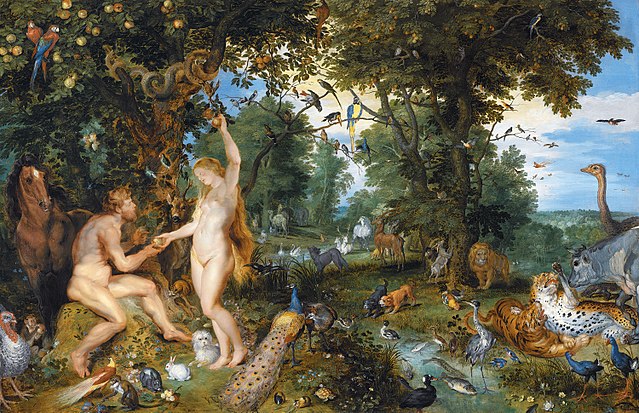
In the 19th century, some LDS church leaders, relying on 1 Timothy 2:14, taught that Eve made a foolish decision leaving Adam no viable option but to do likewise.[1] Brigham Young and others often spoke of “Eve’s curse” as the reason why a woman should submit to her husband and, if he wills it, accept polygamy.[2] But on another occasion Young was more neutral in his assessment of the Mother of All Living, saying: “We should never blame Mother Eve, not the least.”[3] And John Taylor conceded that, under similar circumstances, he undoubtedly would have made the same choice.[4]
As the 20th century witnessed a slow, but radical, change in the Western world’s view of the nature and role of women, the shaming and blaming of Eve in many churches, including the Mormon Church, began to disappear. Today, according to Dallin Oaks “we celebrate Eve’s act and honor her wisdom and courage in the great episode called the Fall.” She did not sin, she did not transgress the law; rather, she made a “wise choice.”[5]
While this explanation has obvious appeal in our modern age, it has numerous problems, as noted by Mormon scholar, Julie M. Smith.
First, it is quite difficult to square this approach with the reactions of all three participants in the story. Adam and Eve hide from God, they are afraid, and they are ashamed.[6] And instead of proudly announcing their “wise decision,” they try to shift blame: Eve points the finger at the serpent and then Adam turns on Eve. Further, their guilt and their fears receive divine confirmation when God angrily decrees the consequences of their actions: the ground will be cursed and they will have to bust their butts to survive.[7]
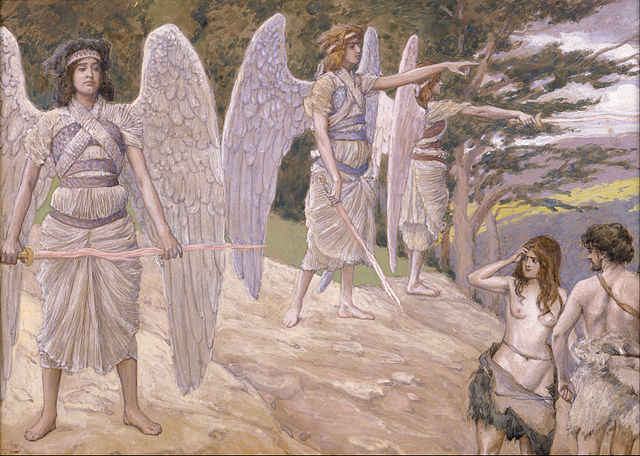
Second, it is indisputable that Eve was given a clear, unambiguous commandment regarding “the fruit of that tree.” Some argue that Adam and Eve were given two conflicting commandments: (1) touch not that fruit, and (2) produce offspring, an idea likewise advanced in Mormon temple rituals. But the injunction to “multiply and replenish the earth” appears in Genesis 1, and most biblical scholars believe it was written by a different author, suggesting that originally there was no conflict and that a conflict arose only later when an editor stitched the accounts together.
Also, there is no textual basis for assuming Adam and Eve could not have had children in the garden. Indeed, a presumption of infertility is at odds with God creating the earth and filling it with all manner of living things that instinctively multiply. Further, Genesis does not suggest that Eve expects she suddenly will be able to have children after she partakes.
I have always believed the “conflicting commandments” argument suffers from an even more grievous flaw: assuming there was such a conflict, why would Adam and Eve be expected to resolve it on their own? If I were in their position, I would lay it at the feet of the Father and say: “Can you help us out here? We don’t want to get on your bad side by eating that fruit over there, but you also told us we are supposed to have offspring and we’re not sure how to go about that?” We should have deep concerns about the nature of a deity who places his children in a position where disobedience is the only option.
Third, the Book of Mormon doesn’t provide much support for the wise choice approach. It highlights the role of the serpent in man’s fallen state and underscores the fact that the fruit was forbidden.[8] And while Nephi does declare that “Adam fell that men might be; and men are, that they have joy,” he says nothing about Eve. Her absence is all the more conspicuous since the Book of Mormon almost always refers to “Adam and Eve” as a unit. Also, there is no reference in the Book of Mormon to the commandment to multiply and replenish the earth.[9]
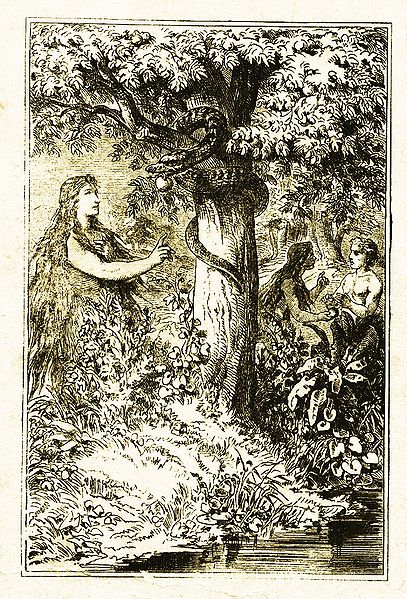
Fourth, it was the serpent, not God, who prompted Eve to partake. How can Satan be the instigator of a “wise choice”? Consider the words of Moroni: “After this manner doth the devil work, for he persuadeth no man to do good, no, not one.”[10] Viewing Eve’s decision as the right thing to do puts us in the untenable position of erasing the Adversary from the story, which is terribly ironic given the expanded role he is given in the unique accounts of the Fall found in the Pearl of Great Price and our temple ceremonies.
Fifth, the wise choice approach also suffers from a failure of imagination, the inability to conceive of other endings to this story. Remember, it is the serpent, not God who nudges Eve across the Rubicon when he says: “There is no other way.” God, by contrast, is silent on the subject.
What if Adam and Eve had simply opted to be patient? Perhaps as they progressed and learned more, God himself would have offered them the fruit. Viewing the admonition to refrain from gaining knowledge of good and evil makes more sense as a temporary restriction than a permanent ban. How often have we been told, “line upon line, precept upon precept, here a little, there a little . . .”?
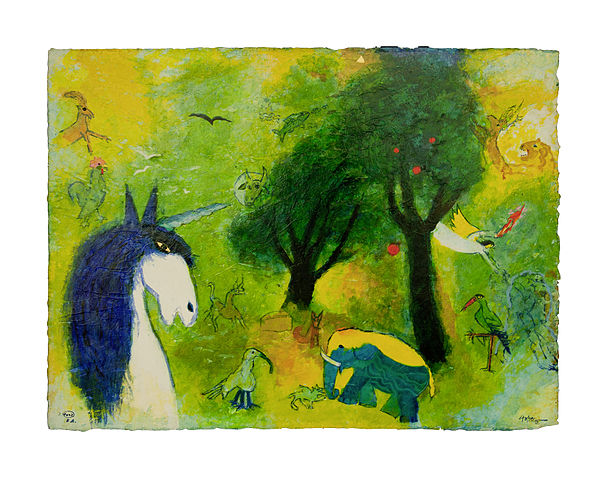
While I find the “wise choice” explanation unconvincing, I find it equally difficult to believe that Eve’s decision was morally neutral or sinful. It is hard to justify the violation of a commandment as morally neutral, especially when it yields such negative results. Similarly, I struggle to understand why human progression requires a sin to get the ball rolling. And while we’re on the subject, how could Adam and Eve do anything wrong before they acquired a knowledge of good and evil?!?
In the end, we are left with a paradox that seemingly defies resolution. No interpretation of Eve’s decision I have encountered is not without its contradictions. Remarkably, this remains the case even with the benefit of the added insight found in the endowment ceremony and Joseph Smith’s account of the creation story in the Book of Moses and the Book of Abraham.
But maybe this is precisely what the Lord intended. The biblical scholar Robert Alter suggests that the story of Adam and Eve purposefully presents the reader with multiple, incompatible viewpoints because that is the best way to tell a story about a world filled with inconsistencies, where truths are often in tension.[11]
Perhaps the first lesson God is trying to teach us with this story is that our minds are incapable of fully grasping the world of the divine, that his ways are higher than ours.[12] And lest we think the dilemma presented to Adam and Eve was a one-off, Jehovah compels many of their descendants to confront similar predicaments.
Abraham is forced to choose between obeying the Lord and sacrificing his son. Later, God gives Satan carte blancheto visit afflictions upon Job and then leaves the poor man—and us—to figure out why. And if we were to complain to God about the inherent unfairness of such situations, I suspect he would respond along the following lines: “Unfairness?!? You don’t know the meaning of unfairness until you’ve experienced the horror of watching your only begotten son—the only one of my children who never did anything wrong—atone, suffer and give his life for the sins of his brothers and sisters, who frequently exhibit no gratitude for his sacrifice!”
We should not try to provide a definitive answer to the meaning of these stories, while sidestepping their contradictions and paradoxes, just to satisfy our desire for certainty or make them conform to our theology. Rather, our ecclesiastical leaders might better serve us if they were to embrace David O. McKay’s humble approach to complex passages of scripture such as these.
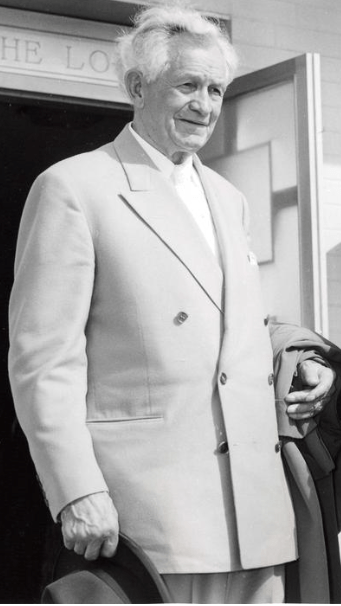
According to Elder Boyd K. Packer, President McKay, while attending a meeting with the General Authorities in the Salt Lake Temple near the end of his ministry, “… stood and put his big, bony hands across his chest, and he began to quote the endowment in the temple…. Then he stopped, and he looked at the ceiling for quite a few minutes, and said, “I think I am finally beginning to understand.”[13]
President McKay wrestled with the angel throughout his life and won a partial victory. Now, that’s a life well spent.
[1] Julie Smith, “Paradoxes in Paradise,” in Fleeing the Garden: Reading Genesis 2-3, Adam S. Miller ed., (Provo, Utah: Neal A. Maxwell Institute, 2017), p. 12.
[2] Journal of Discourses, 12:93-98 (June 30, 1867) and 15:129-35 (Aug. 18, 1872).
[3] Journal of Discourses, 13:145).
[4] John Taylor in Journal of Discourses, 10:312 (10 June 1864).
[5] “The Great Plan of Happiness,” Ensign, Nov. 1993, 72.
[6] Gen. 3:8, 10.
[7] “Paradoxes in Paradise,” pp. 3-4.
[8] Mosiah 16:4; 2 Nephi 2:15, 18-19; Mosiah 3:26; Helaman 6:26; Alma 30:25.
[9] “Paradoxes in Paradise,” p. 7.
[10] Moroni 7:17.
[11] Robert Alter, The Art of the Biblical Narrative, (New York, New York: Basic Books, 1981), pp. 145-46.
[12] Isaiah 55:8-9.
[13] Boyd K. Packer, “A Teacher of Teachers,” McKay Today Magazine, Fall 2006, p. 5, as quoted in “Paradoxes in Paradise,” p. 30.

I am with you on this Eric, with the exception of a quibble here or there (like whether we know enough about the state of life in the garden to know whether the instinct to reproduce was yet imbued).
After all, Eve herself said that she was begiled.
I think we share the confidence that when we hear the full story (in this and many other cases) we will remark at how limited our earthly understanding was.
In the meantime, this story has caused me many hours of puzzlement.
To your point about the additional revelation that we have by virtue of the restoration, we know that not only did God create many other worlds before our’s, but many other falls occurred before our’s too (if we put aside for now the very real possibility that our perception of time is completely unlike the actual nature of time). That being the case, Satan was well aware that the fall needed to happen.
So why was he egging it on?
I suspect that the answer is partly found in Alma 12:26: “and now behold, if it were possible that our first parents could have gone forth and partaken of the tree of life they would have been forever miserable, having no preparatory state; and thus the plan of redemption would have been frustrated, and the word of God would have been void, taking none effect.”
I’ve long reflected on a suggestion made by my father that is connected to one of your comments. It was that Satan‘s first bald lie in the garden was “there is no other way.” I don’t know what that other way was, though I have suspicions. Regardless, Satan was trying to subvert God. I think that means he was trying to subvert the way the fall was supposed to happen. And that he succeeded.
But even then, he ultimately has failed thanks to the atonement of our Savior and a God who cannot be outsmarted.
Thanks so much, Jeff, for your thoughtful comment and additional insights.
This story is like an onion with infinite layers. The number of interpretations, perspectives, and ideas it has spawned seems to grow with each passing year.
There is a “Part 2” to this essay which I am currently working on. I have a theory of my own as to one principle God is trying to teach us with this story, which I will share publicly for the first time in a couple of weeks. It is somewhat unconventional. Just like me.
Thank you for putting into words so many of the philosophical problems with the way this story is approached and reasoned through.
Another assumption that hovers beneath many discussions is that God wanted Adam and Eve to eventually partake of the fruit at some point. This reasoning gets supported by the expectation that the story is a historical recounting of a historical event that metaphysically occurred in order to initiate mortality. Meaning, if the fruit of the tree of knowledge of good and evil is the only way to initiate the possibility of physical death (mortality) then at one point they had to eat it! (This stems from early interpreters reading into the text, Lehi included.)
There is a way to handle this contradiction creating assumption and it has to do with digging deeper into biblical intentions of ancient authors and the way the story sets up the rest of scriptural story telling. We might have to release our tight grip on expectations that the story is a historical recounting of events.
A great topic!
I have always been proud of Mother Eve. I have preferred to feel that she understood what needed to be done to get on with life, and that she had the wisdom and the courage to do it—that man may be.